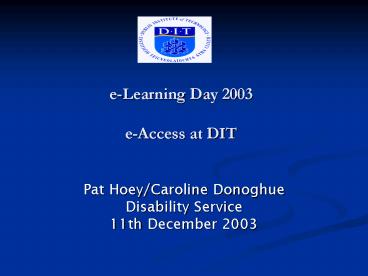eLearning Day 2003 eAccess at DIT PowerPoint PPT Presentation
1 / 18
Title: eLearning Day 2003 eAccess at DIT
1
e-Learning Day 2003e-Access at DIT
- Pat Hoey/Caroline Donoghue
- Disability Service
- 11th December 2003
2
This presentation will cover the following
- Students with Disabilities at DIT
- e-Access Project/The Team/The Issues
- The Solutions/The e-Access Guidelines
- The Use of Assistive Technology
- Review and building on the initiative
3
Students with Disabilities at DIT
Students with Disabilities include the
following Students who are Blind or have a
vision disability - Medical Condition Deaf or
hard of hearing - Mental Health
difficulties Physically disabled -
Communication difficulties Specific Learning
Disability e.g. Dyslexia
4
Number of Students with Disabilities
- Academic Year No.
- 1998/1999 68
- 1999/2000 94
- 2000/2001 133
- 2001/2002 175
- 2002/2003 220
5
Breakdown of Students with Disability
- Specific Learning Difficulties
63 - Deaf/Hearing Impaired 10
- Physical Disabilities 7
- Blind/Visual Impairment 6
- Psychological Difficulties 6
- Acquired Brain Injuries 3
- Diabetes 3
- Cystic Fibrosis 1
- M.E 1
6
Breakdown of Students with Disabilities in
Faculties
- FACULTIES
- Built Environment 19
- Applied Arts 19
- Business 19
- Engineering 17
- Tourism and Food 9
- Science 5
- Trade Apprentices/CERT 12
- TOTAL
100
7
Breakdown of Students with Disabilities by
Student Type
- Student Type No
- Full Time Undergraduate 170
77 - Trade Apprentices/ CERT 26 12
- Part Time 19 9
- Post Graduate 5 2
- Total 220 100
8
Projection/Breakdown of Students with
Disabilities for 2003/2004
- Student Type No
- Full Time Undergraduate 246
- Trade Apprentices/ CERT 40
- Part Time 21
- Post Graduate 6
- TOTAL 313
9
e-Access Project/The Team
- EYPD - European Year of People with Disabilities
- The Institutes Partnership Committee
- Dr Frank McMahon - Manager/Sponsor
- The Team
- Denise Buckley - I.T. Trainer
- Caroline Donoghue - A.T. Officer
- Terry Makewell - Web Administrator
- Jen Harvey - Head of Distance Learning
- Kevin ORourke - Project Manager - LTT
- Miriam Ryan - Partnership Facilitator
- Pat Hoey - Disability Liaison Officer
10
e-Access for who?
- Blind Users
- People with Vision Impairments
- People with Hearing Impairments
- People with Physical Disabilities, including
dexterity issues - People with Specific Learning Difficulties e.g
Dyslexia
11
e-Access/Some of the Issues
- People with Vision Impairments
- May have restricted field of view
- Problems with reading small or moving elements
- Problems with recognising text with poor contrast
- or colour choices
- People with Hearing Impairments
- May have difficulties with the complex use of
language - Problems with instructions
- Problems with audio clips and the use of video
12
E-Access/Issues
People with Specific Learning Difficulties e.g.
Dyslexia
- Definition
- A specific learning disability is any of a
diverse group of conditions - that cause significant difficulties in perceiving
and/or processing - auditory, visual and/spatial information - of
presumed neurological - origin it covers disorders that impact on such
functions as reading - (dyslexia), writing (dysgraphia) and mathematical
calculation - (dyscalculia).
- A Specific Learning Disability is not an
intellectual deficiency - Auditory Processing
- auditory short term memory
- auditory discrimination
13
e-Access/Issues
- Visual Processing
- visual short term memory
- visual discrimination
- Motor Processing
- auditory vocal
- auditory motor
- visuo-motor
- Implications for Learning Style
- e.g. visuo-motor difficulty - copying o/heads
- e.g. auditory motor difficulty - listening and
taking notes
14
e-Access/Solutions
- People with Dyslexia
- Visual Processing
- Visual short-term memory
- Visual discrimination
- Layout
- Insert spaces between paragraphs
- Use Headings, list and consistent structure
- Content
- Include summaries
- Consider turning headings into questions
15
E-Access/Solutions
- Text
- Use large plain font
- Avoid overuse of italics
- Use underline for links (not for emphasis)
- Use Bold for emphasis
16
e-Access/Assistive Technology
- JAWS
- KURZWEIL
- DRAGON NATURALLLY SPEAKING
17
e-Access/Guidelines/Review
Comments and feedback on Guidelines welcome to
disability.services_at_dit.ie More information on
Workplace Partnership initiatives contact Miriam
Ryan, DIT Partnership Facilitator, at
miriam.ryan_at_dit.ie
18
End of Presentation
- Thank you!

